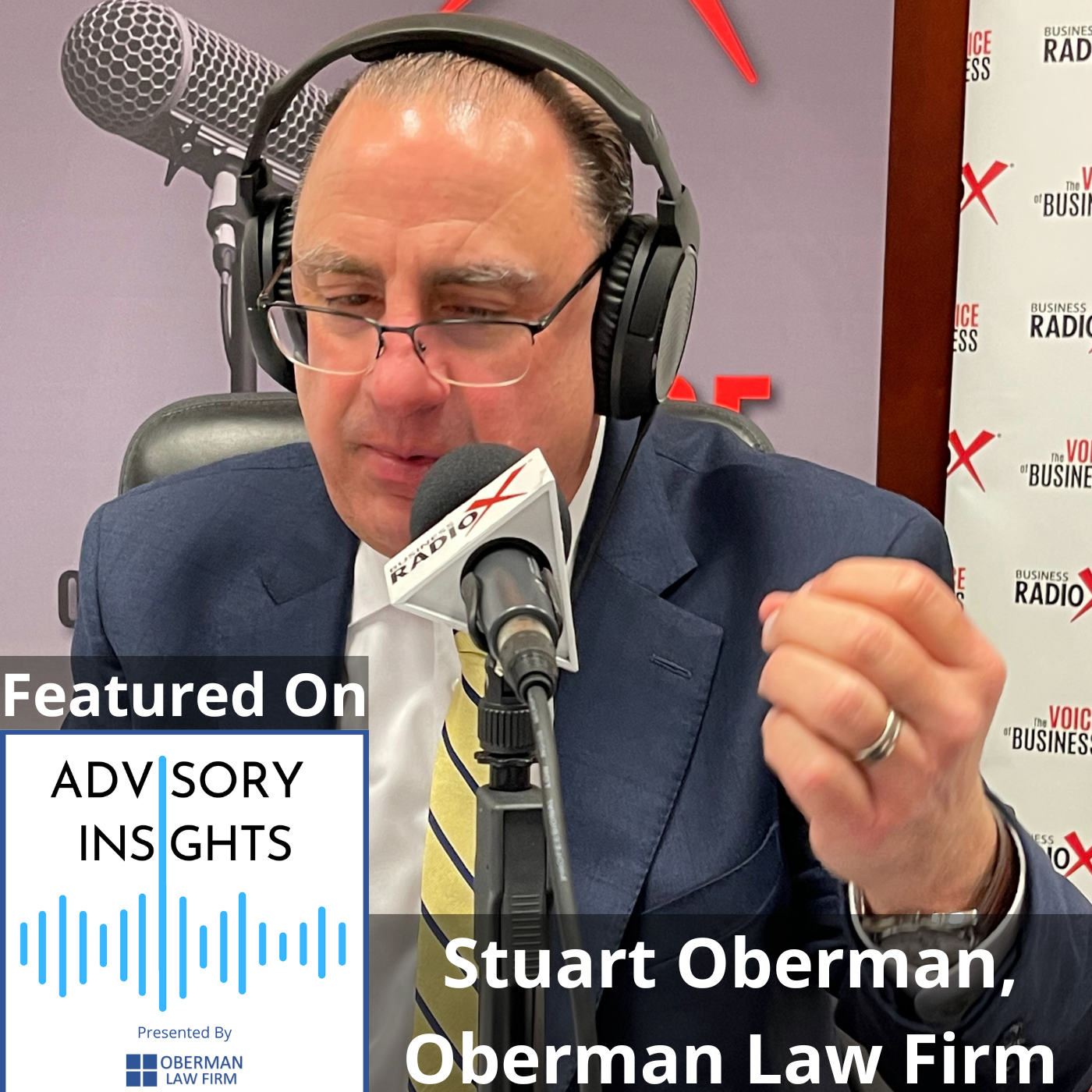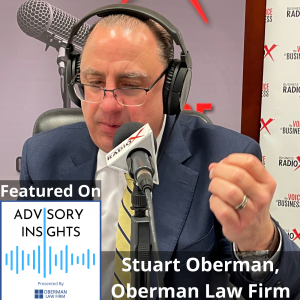
HR Hiring & Onboarding Considerations (Advisory Insights, Episode 38)
On this episode of Advisory Insights, Stuart Oberman of Oberman Law Firm discussed the importance of establishing and maintaining an onboarding process for new employees. Stuart outlines some of the considerations that businesses need to consider when designing their process, including background checks, protecting proprietary information, complying with the Fair Credit Reporting Act, and much more.
Advisory Insights is presented by Oberman Law Firm and produced by the North Fulton studio of Business RadioX®. The series can be found on all the major podcast apps. You can find the complete show archive here.
TRANSCRIPT
Intro: [00:00:01] Broadcasting from the studios of Business RadioX, it’s time for Advisory Insights. Brought to you by Oberman Law Firm, serving clients nationwide with tailored service and exceptional results. Now, here’s your host.
Stuart Oberman: [00:00:20] Hello everyone. Welcome to Advisory Insights. Your host, Stuart Oberman here. I want to talk HR. I want to talk onboarding. Today’s topic, HR Hiring and Onboarding Considerations.
Stuart Oberman: [00:00:33] First and foremost, I don’t care if you got one employee that you’re hiring or 400 or 4,000, you got to have an onboarding process. It is amazing to me how companies will hire their employees and have absolutely zero onboarding process. New employee comes in first day, nothing, nothing.
Stuart Oberman: [00:01:00] So, I want to walk through what we feel is some good onboarding processes from what we discovered. In our firm, we do a substantial amount of HR. We do a lot of compliance issues in hiring and, unfortunately, firing, some not under the best circumstances from our clients. So, I want to take a look at HR and onboarding process.
Stuart Oberman: [00:01:27] New employees, critical process that has to be managed. You can’t just say you have this new employee. I want our employers, our business owners to take proactive steps immediately when that new employee is hired to protect their proprietary information. What does that mean? That means if you don’t want your information on the cover of The New York Times, you better protect it. Because, otherwise, it will end up in someone else’s hands, your competitors, and it is never, ever, ever a pretty sight.
Stuart Oberman: [00:02:05] So, when you hire someone, always look at the end result, employees leave or employees are fired. So, when you hire that new employee, what prevents that employee from taking proprietary information?
Stuart Oberman: [00:02:23] Or let’s look at it another way, folks. So, you hire this great rock star employee and they’re bringing over information from a competitor or another employer, how do you ethically handle that? They bring over their client list, their customer list, all proprietary data, forms from XYZ company. What do you do? How do you handle it? How do you stay out of trouble? You have to have an onboarding process for that.
Stuart Oberman: [00:02:54] So, let’s even take a look at before we get to the onboarding process. One, what are the permissible questions in the application and hiring process? That’s foremost, right? So, most of our clients, they leave it to a person who is ill prepared to answer these questions. Do you have a background check? Are you in compliance with the Fair Credit Reporting Act, which is an absolute moving target? There’s a lot, a lot of transparency issues going on, on a national basis that you’ve got to know regarding reporting requirements.
Stuart Oberman: [00:03:34] So, have you reviewed all of the documents that your new employees will sign? What are those? What’s the blueprint? When do they sign those? Do you have a software program for managing those? You know, so many times our clients just throw things in a stack. They throw them on a server, they throw them somewhere on a computer, a platform, and they can’t even find the darn things. So, how do you manage that? And then, how do you manage what violations occur? All these are onboarding process information you need to know.
Stuart Oberman: [00:04:13] So, again, what’s the risk of not soliciting these obligations? What is the risk? It’s huge. Again, before the onboarding process, non-competes. You bring on a rock star, you want them to have non-competes. Now, all of a sudden, we got the FTC, we have the National Labor Relations Board. Are you prepared to deal with that? Again, onboarding process has to be reviewed. This is an extremely hot topic.
Stuart Oberman: [00:04:48] Non-solicitation agreements, do your employees sign those? Nondisclosure agreements, do your employees sign those? Again, onboarding. “Stuart, all this is part of your onboarding?” Yes. This is day one. Actually, this is before day one because all these things should be signed before the starting date.
Stuart Oberman: [00:05:09] So, I want to walk through a little bit of a checklist here, onboarding checklist. I want you to make a list of what you need prior to the employee’s arrival. What do you need? What’s the list? What’s the first week? Well, before we get to the first week, what’s the first day? What are they signing? What goes on the first week? Is it mapped out? Are they familiar with your departmental policies? Are they familiar with your security? The first day, are they familiar with your sexual harassment policies?
Stuart Oberman: [00:05:47] Are the new policies relevant that you implemented to your employee’s position? If not, you’ve got to revamp those prior to that person getting onboarded. Are they working remote? Next question, do you have a remote policy? “Well, no, no. They’re just working at their home.” Well, what information do they have access to? Your entire database of information. And all of a sudden, their son, Johnny, is playing on the computer, answers a wrong email, and next thing you know, you’re hacked. What’s the policy working remote?
Stuart Oberman: [00:06:26] Do you have professional standards, dress code, code of ethics, office culture? “Well, we’ll just go with the flow.” No, no, no. There’s no such thing in the world anymore. HR, you don’t go with flows. Flows sink you. What’s your first month look like? What’s your first three months look like? What’s your first year look like? Is there an assessment periodically? Is there mandatory training?
Stuart Oberman: [00:07:01] These are things you have to look at from an onboarding process that, frankly, most of our employers do not. And then, when they have an employee who is terminated, fired, discharged, whatever it may be, then they scramble. Well, why scramble when I’ve just given you an outline of multiple things you need to take a look at prior to the engagement, at the time of engagement, and after the engagement of the new employee with the year?
Stuart Oberman: [00:07:29] That’s a lot of information. But, again, it’s not the huge things that get you in trouble. It’s the little things. The little things. Tighten it up, implement it, review it, revise as needed.
Stuart Oberman: [00:07:42] Folks, that’s our quick podcast for today, HR Hiring and Onboarding Considerations. Thanks for joining us. Advisory Insights. Stuart Oberman here, your host. If you have any questions, please feel free to give us a call, 770-886-2400, or email me at stuart, S-T-U-A-R-T, @obermanlaw.com. Thanks everyone. Have a fantastic day.
Outro: [00:08:07] Thank you for joining us on Advisory Insights. This show is brought to you by Oberman Law Firm, a busines-centric law firm representing local, regional, and national clients in a wide range of practice areas, including health care, mergers and acquisitions, corporate transactions, and regulatory compliance.
About Advisory Insights Podcast
Presented by Oberman Law Firm, Advisory Insights Podcast covers legal, business, HR, and other topics of vital concern to healthcare practices and other business owners. This show series can be found here as well as on all the major podcast apps.
Stuart Oberman, Oberman Law Firm

Stuart Oberman is the founder and President of Oberman Law Firm. Mr. Oberman graduated from Urbana University and received his law degree from John Marshall Law School. Mr. Oberman has been practicing law for over 25 years, and before going into private practice, Mr. Oberman was in-house counsel for a Fortune 500 Company. Mr. Oberman is widely regarded as the go-to attorney in the area of Dental Law, which includes DSO formation, corporate business structures, mergers and acquisitions, regulatory compliance, advertising regulations, HIPAA, Compliance, and employment law regulations that affect dental practices.
In addition, Mr. Oberman’s expertise in the healthcare industry includes advising clients in the complex regulatory landscape as it relates to telehealth and telemedicine, including compliance with corporate structures, third-party reimbursement, contract negotiations, technology, healthcare fraud, and abuse law (Anti-Kickback Statute and the State Law), professional liability risk management, federal and state regulations.
As the long-term care industry evolves, Mr. Oberman has the knowledge and experience to guide clients in the long-term care sector with respect to corporate and regulatory matters, assisted living facilities, and continuing care retirement communities (CCRCs). In addition, Mr. Oberman’s practice also focuses on healthcare facility acquisitions and other changes of ownership, as well as related licensure and Medicare/Medicaid certification matters, CCRC registrations, long-term care/skilled nursing facility management, operating agreements, assisted living licensure matters, and health care joint ventures.
In addition to his expertise in the healthcare industry, Mr. Oberman has a nationwide practice that focuses on all facets of contractual disputes, including corporate governance, fiduciary duty, trade secrets, unfair competition, covenants not to compete, trademark and copyright infringement, fraud, and deceptive trade practices, and other business-related matters. Mr. Oberman also represents clients throughout the United States in a wide range of practice areas, including mergers & acquisitions, partnership agreements, commercial real estate, entity formation, employment law, commercial leasing, intellectual property, and HIPAA/OSHA compliance.
Mr. Oberman is a national lecturer and has published articles in the U.S. and Canada.
Oberman Law Firm
Oberman Law Firm has a long history of civic service, noted national, regional, and local clients, and stands among the Southeast’s eminent and fast-growing full-service law firms. Oberman Law Firm’s areas of practice include Business Planning, Commercial & Technology Transactions, Corporate, Employment & Labor, Estate Planning, Health Care, Intellectual Property, Litigation, Privacy & Data Security, and Real Estate.
By meeting their client’s goals and becoming a trusted partner and advocate for our clients, their attorneys are recognized as legal go-getters who provide value-added service. Their attorneys understand that in a rapidly changing legal market, clients have new expectations, and constantly evolving choices, and operate in an environment of heightened reputational and commercial risk.
Oberman Law Firm’s strength is its ability to solve complex legal problems by collaborating across borders and practice areas.
Connect with Oberman Law Firm:
Company website | LinkedIn | Twitter
















